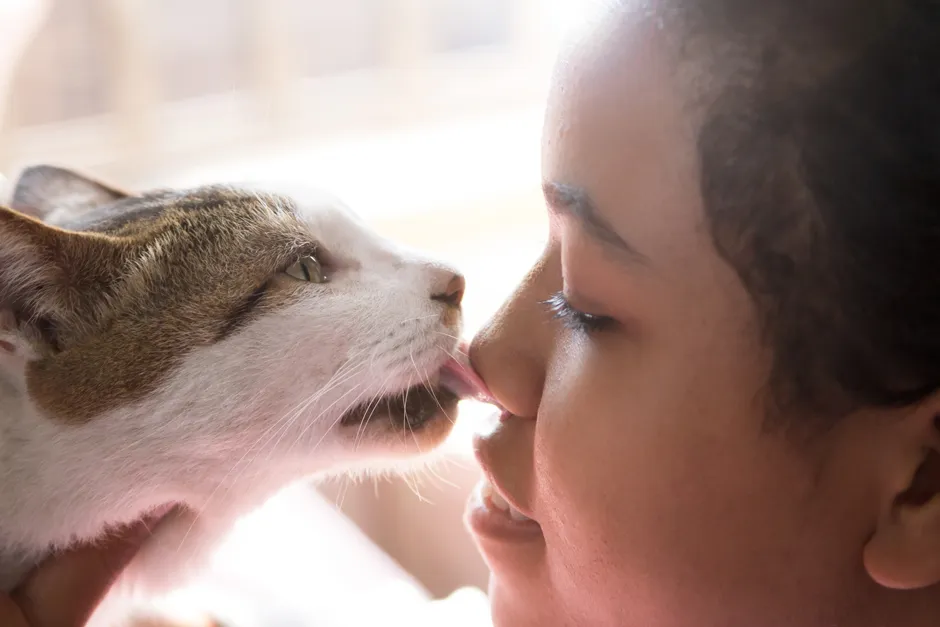Licking: cats are absolutely obsessed with it. In fact, research suggests an adult domestic feline can spend up to 8 per cent of their waking hours grooming their body with their tongue. Licking can also play an important social role with felines, with adults often licking each other just before copulating.
But what about humans: why do cats lick people? The good news: there’s no evidence to say your cat considers this any part of a pre-mating ritual. The bad news: scientists and cat behavioural experts aren’t completely sure why your cat might mop their little tongue against your face or hand.
However, while there’s no overarching and definitive explanation for this behaviour, there are several theories about why domestic felines lick humans. Spoiler: your cat doesn't come off well in any of them.
Why do cats lick people?
There’s no one reason why your cat might lick you. However, there are three main theories as to why domestic felines engage in this behaviour:
- They’re displaying they trust you.
- They’re accessing biochemical information from your skin.
- They’re marking you as another one of their possessions.
The trust theory
Yes, there’s a chance a cat may lick you to show they trust you. Or at least to show they don't consider you as serious competition.
“This type of licking is similar to a cat-to-cat behaviour known as allogrooming, which is basically mutual grooming. A cat will learn this from its mother when they’re a very young blind and deaf kitten. It’s basically to clean the kitten and strengthen social bonds,” says Dr David Sands, an expert in animal psychology with over 25 years of clinical experience.
Read more about cats:
- Why do cats knead?
- Why do cats purr?
- Why you’re stroking your cat completely wrong (and how to do it right)
“Because of these maternal origins, adult cats will only lick other cats they trust and are not in competition with. And this trusting grooming behaviour may be transferred to a human.
"After all, cats are not sitting there saying ‘I’m a cat and you’re a human being’. To them, animals are either in competition with them or not. And licking shows you're not in competition.”
In other words, if your cat licks you, it’s not a positive sign of attachment. It’s just not a negative one (which is as good as it gets with a cat).

If in doubt, consider the University of Lincoln study tactfully titled Domestic Cats Do Not Show Signs of Secure Attachment to Their Owners.
When swapping 20 felines and their human owners, researchers found the cats appeared to bond as well with strangers (shown through behaviours such as play and mirroring) than with their actual owners.
The researchers concluded: “These results are consistent with the view that adult cats are typically quite autonomous, even in their social relationships, and not necessarily dependent on others to provide a sense of security and safety.”
The biochemical theory
While this sounds complicated, this is essentially the very simple idea that a cat will like you because they’re interested in whatever scent is on your hand.
“Cat taste buds are so sensitive – they can pick up scents from our skins that could include pheromone secretions from other animals,” says Sands.
“It could also be that you’ve got salt, moisturiser or whatever you've just eaten on your hand. To cats, all these are interesting scents and licking allows them to check it out. That's simply all it might be.”
The possession play theory
Cats are, as Sands puts it, “scent machines from head to tail”. And their favourite smell? Their own. In fact, they love their own unique scent – which acts as an airborne fingerprint – so much that they think it should supplant all others.
As Sands explains, this is why a cat may lick themselves after you stroke them – “It’s purely to get rid of your scent!” he says.
“So much other cat behaviour comes down to possession and ownership. Everything that they do is very territorial,” Sands adds.
“Sometimes when cats groom other cats and people they’re scraping off scents and supplanting it with their own. It’s their way of marking and saying ‘This is mine! I own you!’”
He adds: “People always think cats rubbing themselves against you or things you touch are expressing love. But actually, cats are very possessing individuals. For them, the more they can brush past you and deposit their scent, the better!”
About our expert, Dr David Sands
With a doctorate in ethology (animal psychology) at Liverpool University, Sands has over 25 years experience at his animal behavioural clinic. He is a Fellow of the Canine and Feline Behaviour Association (CFBA) and the Association for the Study of Animal Behaviour (ASAB).
Sands is also the author of Cats 500 Questions Answered (Hamlyn, £4).
Read more about the science of cats